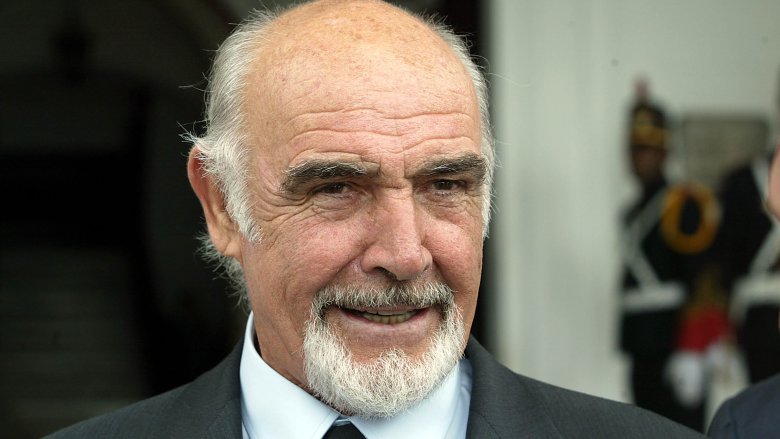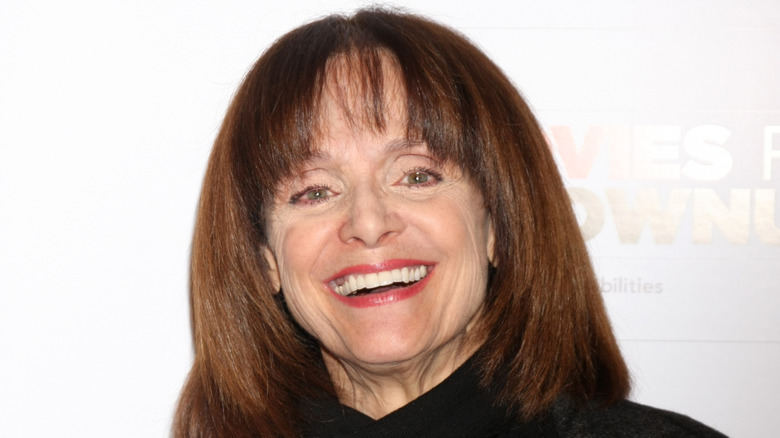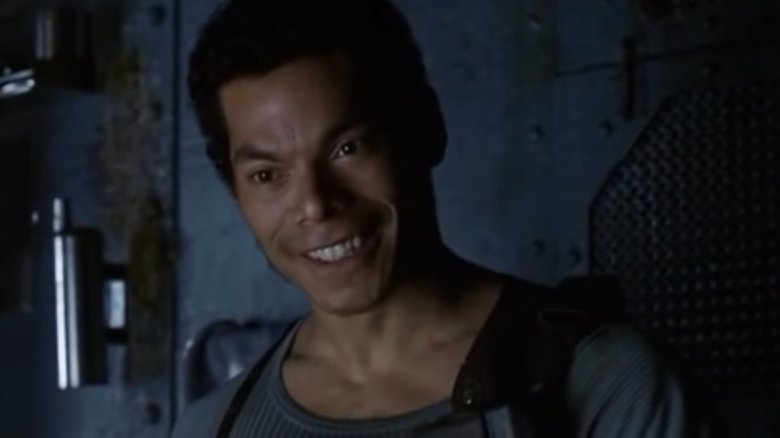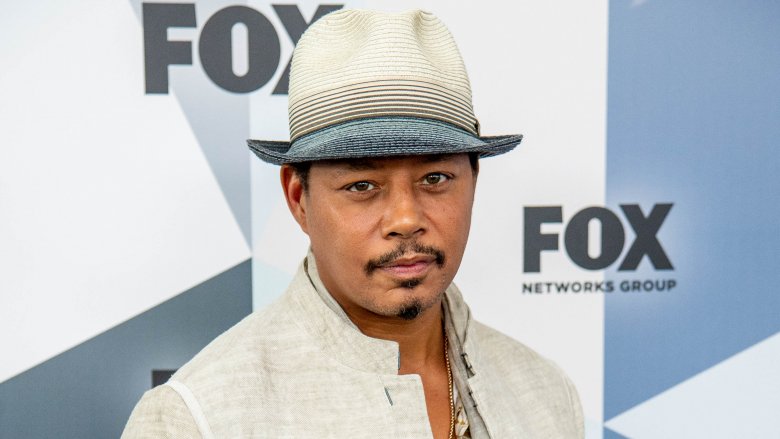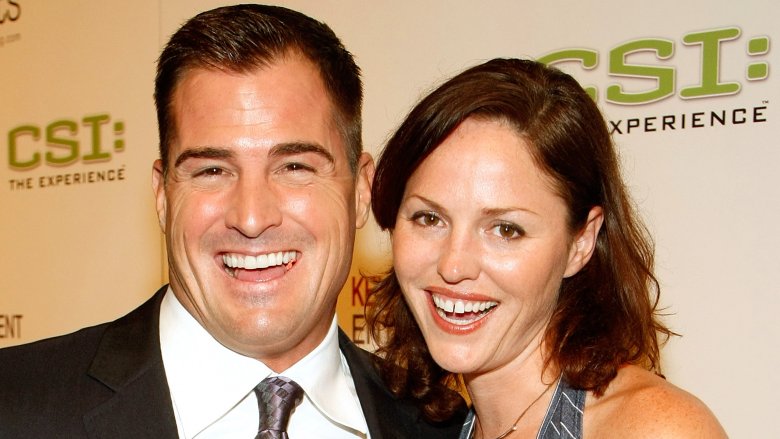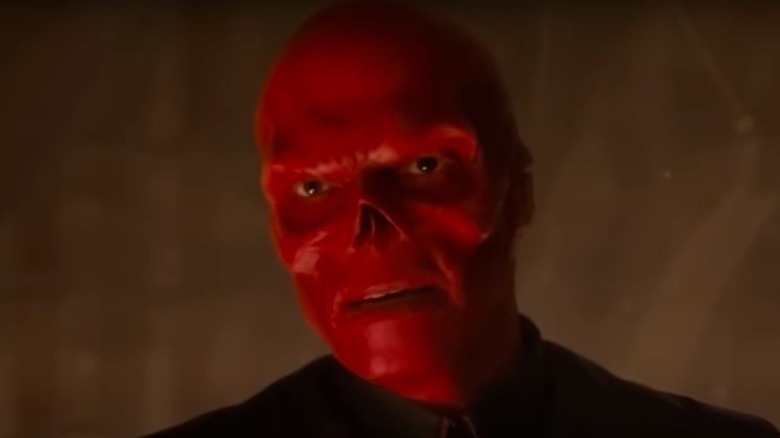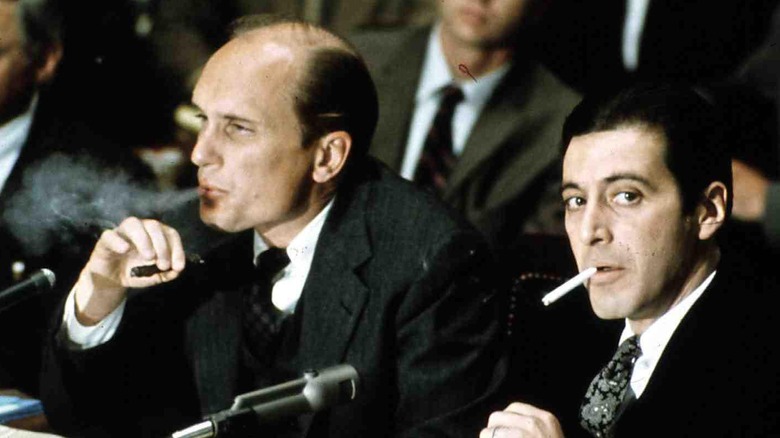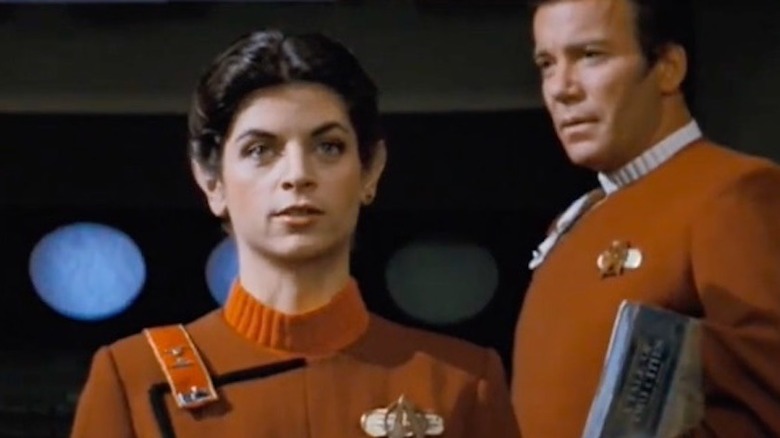Actors Who Were Fired After They Asked For More Money
We may receive a commission on purchases made from links.
Money is a hot topic in show business. Some say these Hollywood celebrities are overpaid. Others are obsessed with the rich and famous. Few really know how all that dough is divvied up. An actor's monetary value is a shadowy concoction of talent, audience allure, credentials, physical appearance, gender, and good ol' fashioned greed that's calculated according to who's doing the appraisal. In other words, it's complicated.
Agents, managers, and the Screen Actors Guild all help govern the process a bit, making it less subjective today than in the past, but that doesn't mean all financial negotiations go swimmingly in Hollywood. By now, we've all heard about the gender wage gap, and we're aware that many women have demanded more money and received it. We can only assume that many male actors have bet on themselves and won as well, but what about those thespians who played hardball and lost?
There are risks to asking for a raise. Everyone knows this. You could be denied and embarrassed, sure, but you might also lose your job. While this drastic reaction may be rare in Hollywood, it does happen. For the actors on this list, risking it all for a larger piece of the pie sent them home hungry.
Suzanne Somers was used as an example for other actors
As the "Three's Company" cast and crew prepared for its fifth season in 1980, the optimism around the TV series was palpable. The sitcom had become one of the most popular shows on television, and two of its stars, Suzanne Somers and John Ritter, had just earned Golden Globe nominations. But Somers was not happy.
Trying to capitalize on her popularity, she approached ABC executives and argued that she deserved more than the $30,000 she was making per episode. While the network agreed, reportedly offering Somers a $5,000-per-episode raise, Somers had a much larger number in mind. According to The Hollywood Reporter, the actor demanded $150,000 per episode. That would put her on par with other TV stars, including co-star Ritter. When the network declined her request, Somers refused to shoot and got fired for it.
Under ideal circumstances, Somers might have won her fight. The problem, according to her husband, Alan Hamel, was that ABC allegedly felt pressured to nip a recent trend in the bud. "I got a call from a friend who had connections high up at ABC and he said, 'They're going to hang a nun in the marketplace and the nun is Suzanne,'" Hamel told The Hollywood Reporter. "The network was willing to do this because earlier that year the women on 'Laverne & Shirley' had gotten what they asked for and they wanted to put a stop to it."
Sean Connery's James Bond was replaced after a pay dispute
Sean Connery may have quit or he may have been let go. Either way he was replaced after "You Only Live Twice." Even before making that film, Sean Connery made it known that he had grown bored with the James Bond franchise, but the outspoken star also took issue with the financials surrounding the films.
Connery felt that he should be getting more of the franchise's gross profits. The leading man reportedly signed on to "You Only Live Twice" for $750,000, plus a 25% share of merchandising. Producers reportedly knew that wouldn't satisfy Connery next time, so they set out to find a new star. Enter George Lazenby.
With Lazenby waiting in the wings as a possible successor, producers were able to negotiate with Connery from a position of strength. When it came time to create the next Bond film, "On Her Majesty's Secret Service," Connery reportedly declared that, in order to return, he would need $1 million as well as a percentage of the back-end earnings. Unwilling to meet these demands, the producers reportedly hired Lazenby as the new Bond for $50,000.
Valerie Harper's sitcom was rebooted without her
During the second season of "Valerie," a sitcom starring Valerie Harper and a young Jason Bateman, there was hope in the air because show ratings were improving. With the series looking primed for a strong third season and Harper starring as the titular character, the actor decided to ask for a raise.
She was reportedly set to make $56,750 per episode and 10% of the show's gross profits, but she requested a new contract of $100,000 per episode, plus 35% of the profits. When the studio balked, Harper pulled out an old trick. 12 years earlier, she was the star of "Rhoda." Back then, when her raise request was denied, Harper refused to show up for work and got what she wanted. This time, however, the hold-out tactic was not as successful. The show's producers agreed to terms on a new contract worth $65,000 per episode, plus 12.5% of profits. This got Harper back on set, but not for long. After filming only one episode, she was fired.
With the titular star gone, "Valerie" writers killed Harper's character, and the show was retitled "Valerie's Family" for Season 3. A season later, the show was renamed "The Hogan Family." While the sitcom remained popular without its original star, Harper got the last laugh, successfully suing producers for wrongful dismissal.
Marcus Chong was a glitch in the Matrix
The Marcus Chong saga is a crazy story that somehow remains relatively under the radar. After the success of "The Matrix," the film's creators set their sights on two sequels. When the Wachowskis reached out to sign Chong, they reportedly offered him $250,000, but Chong wanted a million.
Chong's lawyer allegedly delivered an ultimatum to the Wachowskis in a letter, saying that the actor will either take $500,000 along with bonuses, otherwise he would appear in the movies for free. This somewhat strange negotiating tactic backfired. Chong was removed from the franchise.
Afterward, the actor reportedly called Warner Bros. and engaged in a conversation with a fellow supposedly speaking on behalf of Andy Wachowski. That call catalyzed an intense amount of drama and confusion. Chong alleged that he received death threats and even tried to press charges, but at some point, Chong was supposedly taken into custody for making threats. The actor later unsuccessfully sued the production company and distributors of "The Matrix."
Disney got fed up with Steve Whitmire's negotiating tactics
Though there are multiple reported reasons why Steve Whitmire, the voice and puppeteer behind Kermit the Frog, was fired by Disney, money was supposedly involved. In fact, one of the reasons given to Whitmire for his dismissal was for refusing to work, allegedly because of a contractual dispute. According to Whitmire in an interview with The Hollywood Reporter, he was simply a casualty of "a dispute on a contract classification between SAG-AFTRA and Disney Labor Relations."
But the problems may go deeper than just one contract dispute. Disney and The Muppets Studio claimed Whitmire's negotiations held the start of production hostage and had done so for years prior. A source told Gizmodo that Whitmire's contract demands go all the back to his days on "Sesame Street," where he voiced Ernie and other minor characters for years. "People think he left 'Sesame Street' to focus on 'The Muppets,'" the insider said. "He was actually fired for demanding too much money." Hey, it's not easy being green.
Jaimee Foxworth discovered family doesn't matter
Though no one from the "Family Matters" cast or crew confirmed exactly why Jaimee Foxworth was let go from the show, there have long been rumors surrounding one of the strangest character removals in TV history. It all took place during the show's fourth season. Judy, the youngest daughter in the Winslow family, goes upstairs during one episode and never comes back down.
The show's co-creator, William Bickley, told People that Foxworth's removal was due to "a budget consideration," but there's another long-standing rumor that Foxworth's mother might have been responsible for the actor's dismissal. According to an alleged and mysterious BET article, which has circulated in online forums for years and may be the cause of the rumor in the first place, Foxworth blamed her mother for the firing due to the matriarch asking for more money. Foxworth's mother, Gwynn Fox, was also her manager during this time, so the story is somewhat plausible.
The actor's career never fully recovered from that early setback, but Foxworth has kept a sense of humor about the whole thing. When asked about her "Family Matters" character, she told People, "I'm still up there in my closet, putting on my clothes."
Crispin Glover claimed he was pushed out of Back to the Future Part II
Even though Crispin Glover has changed his stance a couple of times about what really happened after "Back to the Future" and why he never returned for the sequel, one of his explanations is that the studio wouldn't meet his pay demands. According to Glover's interview with the AV Club, he was offered $150,000 to reprise his role as George McFly in the sequel, which was apparently far less than co-stars Tom Wilson and Lea Thompson.
In Glover's opinion, producers were trying to force him out. He claimed they wanted his character to hang upside down in the film to "make [him] physically uncomfortable" as "punishment" for questioning the script. Glover said he would have gone through that discomfort if he was properly compensated for it. When the actor tried to negotiate, his bosses allegedly dropped their offer even lower. "They went down $25,000!" Glover explained. "It was very clear they didn't want me in the film."
The Hollywood Reporter told a slightly different story, suggesting Glover wasn't happy with the sequel's script, so he tried to up his pay to $1 million. Glover claimed that story was part of a smear campaign, insisting in his AV Club interview that the notion that he "asked for the same salary that Michael J. Fox was getting" is a "total fabrication."
Terrence Howard was reportedly replaced in Iron Man over money
While it's difficult to say for sure if Terrence Howard was fired or pushed out from the "Iron Man" franchise, the result was the same. He was in the first "Iron Man," but didn't come back for the second. Howard was reportedly ousted from the franchise for a number of reasons, but the primary driver was allegedly a battle over pay.
Howard reportedly earned the biggest payday on the set of the first "Iron Man." His $3.5 million paycheck ($4.5 million, according to Howard) was bigger than even the film's star, Robert Downey Jr., which was likely a combination of the risks associated with betting on Downey at that time and Howard's recent Oscar nomination for "Hustle & Flow." Well, that was the last time Downey made less than his co-star. In fact, Downey went on to top Forbes' "World's Highest-Paid Actors" list for three straight years.
To hear Howard tell it, which he did on the "Sway in the Morning" radio show in 2013, the reason Downey earned so much in subsequent "Iron Man" films is because the studio borrowed from Peter to pay Paul or, rather, borrowed from Terrence to pay Robert. Howard claimed that he was set to make $8 million for "Iron Man 2" (which makes us wonder, how much is Howard worth?). Instead, the studio allegedly reworked the contract and offered him only $1 million, planning to use the leftover cheddar to pay Downey. When Howard pushed back, the studio supposedly walked away and hired Don Cheadle instead.
Jorja Fox and George Eads' contract dispute with CSI resulted in a big pay loss
The behind-the-scenes drama on "CSI: Crime Scene Investigation" in 2004 was more intense than what was filmed for the show. Two of the show's stars, Jorja Fox and George Eads, were both fired after they allegedly refused to report to work for shooting. Both actors were reportedly unhappy with their proposed raises of about $20,000 per episode, which would have brought their total wages to about $120,000 per episode. When the actors held out for more, they were nixed.
"There comes a point where we feel a contract is a contract," said CBS co-president Leslie Moonves. "We all have to look out for the future of the network television business."
There is a happy ending here: Eads and Fox were rehired shortly after they were fired after both actors asked for their jobs back, but there was a catch. Those raises that were initially offered were rescinded, meaning the actors negotiating tactics actually cost them about $1.76 million. That stings. But here's the big kicker: Eads claimed he wasn't even playing hardball when he didn't show up to work. "They think it's about money, and it's not," he said. "I overslept."
Lauren Cohan walked away from The Walking Dead
Lauren Cohan's character, Maggie Rhee, was a staple on "The Walking Dead" for almost a decade, but in 2018, AMC had to make the difficult decision to either concede to the actor's contract demands or give her character the ax. In an interview with Entertainment Weekly, Cohan admitted that she was surprised by her negotiations, which made her think that maybe it was time to make an exit.
"I took that, how baffled I was, and thought, 'Okay, well that's a sign. This is maybe just not a fit anymore,'" she told EW. "To feel like we weren't lining up in so many ways I just thought, 'Okay, well, maybe that means something.'"
Ultimately, she ended up walking away from "The Walking Dead," but the decision to let her go was a big departure from the comic books upon which the series is based. Breaking rank with the books is not unheard of but certainly unorthodox.
Daniel Dae Kim and Grace Park were denied equal pay on Hawaii Five-0
Daniel Dae Kim and Grace Park were with "Hawaii Five-0" since the very beginning of the rebooted CBS series in 2010. After a whopping seven years on the show, the pair, who played Chin Ho Kelly and Kono Kalakaua respectively, exited amidst a contract dispute in 2017. So what's the deal? Apparently, there was no deal.
Kim and Park were reportedly searching for equal pay to stars Alex O'Loughlin and Scott Caan. CBS wouldn't budge and settled with a final offer that was reportedly 10 to 15% lower than O'Loughlin and Caan. Ultimately, CBS wrote Kim and Park off the show in Season 8. Their absence was addressed in the premiere, but the real-life drama might have been even more exciting.
Though the network released glowing statements about the departing stars, Park was reportedly not thrilled when showrunner Peter M. Lenkov fired off a tweet suggesting she left the series to focus on family. "The whole situation was just a bit too charged for me," she told Deadline. "I let him know, 'That wasn't cool that you made a statement on my behalf.' ... I know he did it to be helpful, and I care about Peter as a person, but I didn't leave for that reason."
Hilary Duff and her mother refused Disney's offer for Lizzie McGuire 2
Lizzie McGuire has had her own transformation since being an icon for pre-teens of the early aughts — crimped hair and all. Unfortunately, all good things can't last (and you know, we eventually do grow up as much as we'd like to stay young forever). The real reason Paolo wasn't stinking up "Lizzie McGuire 2" with his hacky singing boils down to a money dispute. Without Hilary Duff, there's no "Lizzie McGuire," and mama reportedly wanted more money.
The "Lizzie" franchise came to a close when Duff's momager, Susan Duff, wouldn't accept Disney's deal for a sequel. The star was reportedly offered a $500,000 bonus for the second movie if the first reached $50 million. This was a huge increase from the $100,000 bonus Disney initially offered and part of a $4 million overall offer for the sequel as well as 4% of the back-end earnings. Basically, Hilary's "Lizzie" payday ballooned, but her mother wanted to receive the bonus immediately rather than waiting. Instead, Disney withdrew its deal completely and effectively ended the "Lizzie McGuire" franchise.
"Disney thought they'd be able to bully us into accepting whatever offer they wanted to make, and they couldn't," Hilary's mother claimed to Entertainment Weekly. "We walked away from a sequel. They walked away from a franchise."
Hugo Weaving was booted from the MCU when he refused a lowball offer
"Captain America: The First Avenger" made its big-screen debut in 2011, with Cap (Chris Evans, an actor fans haven't seen as much of anymore) facing off against devious Nazi Johann Schmidt, a.k.a. Red Skull (played by "The Matrix" star Hugo Weaving). When the Marvel superhero returned to the screen, Red Skull did not — although that wasn't the initial plan. The Russo brothers — who directed "Avengers: Infinity War," and "Avengers: Endgame" – confirmed that Weaving had been approached about appearing in those movies, but ultimately did not participate.
Interviewed by Time Out in 2020, Weaving revealed that his original deal was for the first "Captain America" and then two more films. "I was thinking [Red Skull] probably wouldn't come back in 'Captain America' but he may well come back as a villain in 'The Avengers,'" the actor explained. "By then, they'd pushed back on the contracts that we agreed on and so the money they offered me for 'The Avengers' was much less than I got for the very first one, and this was for two films."
While Weaving claimed the original contract called for him to earn more money with each movie, the studio reneged on their deal. "They said: 'It's just a voice job, it's not a big deal.' I actually found negotiating with them through my agent impossible," he recalled. "And I didn't really wanna do it that much. But I would have done it." When a deal could not be reached, he was let go, ending his brief one-film tenure in the Marvel Cinematic Universe.
Robert Duvall balked at making a tiny fraction of Al Pacino's salary and lost his role in The Godfather Part III
Among his many iconic screen performances, Robert Duvall starred in "The Godfather" as Corleone family consigliere Tom Hagen, adopted son of Marlon Brando's mob boss Vito Corleone. Tom remained in place to advise the family's new leader, Michael Corleone (Al Pacino), in 1974's "The Godfather Part II."
When "The Godfather Part III" hit movie screens nearly 20 years later, Duvall was not part of the cast. In the film, it's revealed that Tom died of cancer at some point during the 1970s. Fans of the franchise, however, found this odd, given that Duvall was very much alive and kicking at the time the 1990 film was made. In a 2004 interview with "60 Minutes," Duvall revealed the reason he didn't return for the third "Godfather" film was money, specifically the amount he was being offered in comparison to how much Pacino — who reportedly burned through much of his fortune – was being paid.
"I said I would work easily if they paid Pacino twice what they paid me, that's fine," Duvall said. "But not three or four times, which is what they did." The studio did not meet Duvall's salary demand, and he was axed from the movie. His character was killed off, while another actor, George Hamilton, was brought in as B.J. Hamilton, new lawyer for the Corleone family.
Simpsons voice actor Maggie Roswell was replaced after asking for a raise
When "The Simpsons" killed off Maude Flanders, wife of Ned Flanders, in 2000, there was more behind the character's death than a sad storyline. Maggie Roswell, the actor who provided Maude's voice for more than a decade, revealed she parted ways with the show when she asked for a raise, and was refused (the Fox network, however, claimed her exit came about because she no longer wanted to commute from Denver, where she lived, to record her voice parts in LA).
"There's a presence that I helped create in Springfield," Roswell, who had been a member of the show's cast since its debut in 1989, told the Los Angeles Times. According to Roswell, she felt within her rights to ask for more money when other members of the cast negotiated multimillion-dollar deals based on the massive success of the show (a 2011 study reported that "The Simpsons" had generated $1 billion in revenue by that point).
Roswell claimed she was being paid a measly $2,000 per episode for voicing Maude and several other "Simpsons" characters, but when she requested a raise to $6,000, Fox offered her an extra $150 an episode. "I was part of the backbone of 'The Simpsons,' and I didn't think [the requested raise] was exorbitant," Roswell said. "I wasn't asking for what the other cast members make. I was just trying to recoup all the costs I had in travel. If they'd flown me in, I'd still be working."
Money was the reason Kirstie Alley's Star Trek character was recast with another actor
Before going on to small-screen success in "Cheers," Kirstie Alley's most high-profile role was portraying Lieutenant Saavik, a Vulcan member of the Enterprise crew in "Star Trek II: The Wrath of Khan." Oddly, when "Star Trek III" hit theatres, Saavik had been recast, with Robin Curtis playing the pointy-eared character in the third "Trek" flick.
Fans learned the reason for that cast switcheroo after Alley gave a revealing interview to co-star William Shatner for his book, "Star Trek Movie Memories." "Paramount's offer came in very, very low; it was less than they offered me for 'Star Trek,' so I figured they weren't interested in me playing the part," Alley told Shatner (via Entertainment Now).
When subsequently interviewed for StarTrek.com, Alley confirmed that she was offered less money to return than she'd been paid for her first "Trek" feature. "I'm not trying to sound ungrateful at all, because what they paid me when you did your first job is fine. But it wasn't like it was a massive amount of money, trust me. It just wasn't," she said. "And so that never made sense to me. Like, 'You're not paying as much as the first one, and it's a bigger role?' It just didn't make sense to me."



